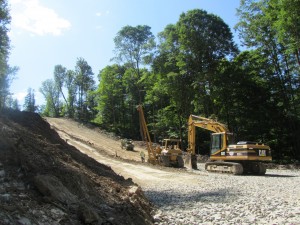Pennsylvania gets no property tax from expanding pipelines
-
Susan Phillips

Kim Paynter / WHYY/Newsworks.org
Workers prepare to lay a new Marcellus Shale gas pipeline in Susquehanna County, Pa.org
While Pennsylvania gains no tax revenue from expanding pipelines, that’s not the case across the river in New Jersey. The Allentown Morning-Call reports on how the proposed Penn East pipeline is expected to generate $54,000 for Delaware Township, New Jersey, and $329,000 each year to the local county and school district. But on the Pennsylvania side of the river, the towns, counties and school districts hosting new pipelines get zero tax dollars from the project. That’s because Pennsylvania charges no property tax on oil and gas operations, which includes an exemption for pipelines.
More from the Morning-Call:
Tax policy differs from state to state, but in states that tax pipelines as property, they can produce significant revenue.
Some 10,775 miles of pipeline in Iowa generate $50 million to $60 million a year in property tax revenue for local municipalities, counties and school districts, according to the Iowa Department of Revenue.
Iowa towns could get an additional $27 million and North Dakota and South Dakota may see $13 million in new property tax revenue from a planned 1,100-mile crude oil pipeline from the Bakken oil fields in North Dakota to Illinois, according to a study released last week by Dakota Access LLC, which plans to build the pipeline.
With the severance tax debate, opponents of taxing Marcellus Shale oil and gas operations point to Pennsylvania’s high corporate income tax. Pennsylvania corporations pay 9.9%, while New Jersey is close behind at 9%. Texas, the country’s largest oil and gas producer, charges a severance tax as well as property taxes on oil and gas operations. The Penn East pipeline is just one of several new pipelines proposed to transport Marcellus Shale gas to East Coast markets.
















